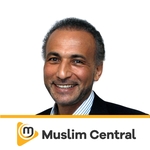Tariq Ramadan – Ramadan Chronicles #28 Culture

AI: Summary ©
The speaker discusses the importance of understanding the culture of Islam and the need for critical engagement with religious principles and ethics. They stress the need to resist specific culture and emphasize the importance of avoiding arrogance towards another culture. The speaker emphasizes the need to reform culture and involve men and women in principles to achieve a more ethical and cancellative lifestyle.
AI: Summary ©
We have been talking about all these resistance,
and there is one which is very subtle.
Not easy,
very difficult sometimes,
but we need to get it as it
is the center of
our,
understanding of Islam.
This has to do with culture. We need
sometimes
very important
dimension here.
As we say, there is no religion without
culture. Any religion has to do with a
specific culture. It happened with the prophet, peace
be upon him, with the Arabic culture,
and there is no culture without a religious
reference. And this is also everywhere,
the case. But at the same time, religion
is not culture. So no religion without culture,
no culture without religion, but religion is not
culture. Having said that, what we need to
get is with our
religious principles,
our ethics, we need to be critical with
any culture and to understand that
some things are very good, very positive, but
there are features
and habits and and way of dealing with
things that should be criticized
from within
as a culture and in all the cultures.
And this happened to the prophet, peace be
upon him, when he was in Mecca. This
was a very specific culture, and he had
to leave after 13 years to Medina. And
in Medina, it's another
culture. Knowing here that the same principles
as Muslims
were in Mecca in Medina, but when the
Muhajirun
went to
Medina, they just,
face another culture. And the first was Omar
Ibn Al Khattab in the way, for example,
women were very,
present, having another role within the society. And
they were answering back to men, and he
was surprised. And he went to the prophet,
alayhis salam, who made it clear, this is
not against Islam, the same principle. But this
culture in Medina
is as Islamic. And we have to be
critical towards the fact that, for example, in
Mecca, in the patriarchal
culture,
things were not done properly. All this was
a step towards something else. The same when
it comes to,
aesthetic and arts where the prophet, alaihis salatu,
was respecting an ansar,
loving to have,
singing during the weddings, for example.
So these are things which are very important.
And it's not because we are coming from
an Arabic culture that everything in this Arabic
culture is good. We have to be critical.
Patriarchal,
attitudes, for example, and putting men at the
center of everything. This is not Islamic. It's
much more cultural than Islamic.
The same when it comes to sometimes arrogance
towards another culture, and we have it in
the Quran.
You cannot just mock and and dismiss another,
community or another culture. It they might be
better than you. So this has to be
done,
with ethical principles
and not,
in the way we deal with
with our culture. So whatever
is your culture,
you need to be critical to ask what
is good and what could be reformed and
what we can keep and what we have
to
change. And when it come to a new
culture, when you are settling down in a
country, you need to take from this culture
everything which is good, and at the same
time,
change or resist things that could be bad.
No way that you can take a culture
per se without being critical. You have to
resist
some dimensions,
some features of specific culture, be it agriculture,
western culture,
whatever, Asian culture. This is the way we
are in the name of our principles
to try to reform
all the culture,
our respective culture into something which is much
more
principled,
much more ethical
than what culture could be. Because every culture
should be improved. That's the way that's the
the way we have to be involved
as believers,
as men and women of principles.
Remember to tell the people you love that
you love them. Life is fragile.